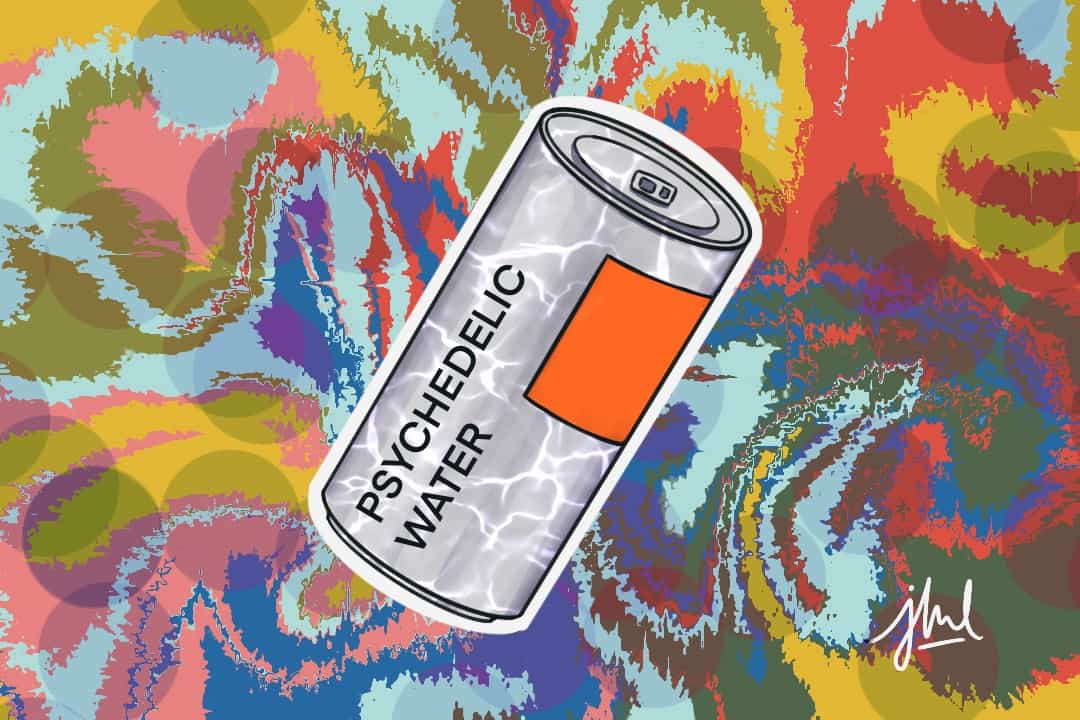Despite its suggestive name, Psychedelic Water does not contain any illegal psychedelics like LSD or psilocybin. Instead, it consists of extracts of two mild, natural psychedelics: kava and damiana leaves. Neither ingredient is a hallucinogen. Psychedelic Water also contains green tea leaf extract, which the manufacturer claims balances kava’s effects and bitter taste. The drink first became popular on TikTok, ultimately resulting in a partnership with Urban Outfitters.
Psychedelic Water results in a “mild, calming sensation,” with its mood-boosting effect being attributed to kava. Kava is another word for the aromatic Polynesian shrub Piper methysticum, which is native to Oceania. The largest exporters of kava are Tonga; Vanuatu; Samoa; and Fiji, where kava is considered a national drink. The term kava also refers to the bitter drink made from the roots of the kava plant. Kava has traditionally been cultivated and consumed in Pacific Island societies, including during religious and cultural ceremonies, due to its psychoactive properties.
It is scientifically proven that kava consumption may result in slight numbness of the tongue and lips, increased sociability, muscle relaxation, and a sense of peace and harmony. Kava has successfully been used to treat generalized anxiety disorder, although researchers noted isolated cases of psychosis and hallucinations following kava use by the tested patients. Kava appears to be non-addictive, but chronic consumption of kava may result in increased tolerance. Chronic kava use is also associated with scaly skin rashes, weight loss, nausea, loss of appetite, and indigestion. These effects typically fade when kava consumption stops. At high doses — higher than those in the mild Psychedelic Water — kava’s effects are similar to those of alcohol, inducing drunkenness, imbalance, and slurred or slow speech. Unlike alcohol, kava does not cause hangovers or impair reasoning, which explains why some consume Psychedelic Water socially as an alternative to alcohol. Like alcohol, however, kava has been linked to liver problems.
Traditional kava drinkers in Pacific cultures generally do not report liver damage. Some Western kava consumers, however, have reported various levels of hepatotoxicity including cirrhosis, hepatitis, and liver failure — although these results have been inconsistent across various studies. Some Pacific kava drinkers argue that differences in physiological effects may arise because of the way the kava extract is obtained, which is traditionally done via water extraction. From 1999 to 2002, 10 patients from the US and Europe needed liver transplants after consuming products containing kava; they either took kava in capsule form or extracted it from acetone or ethanol.
Overall, the scientific consensus on kava’s effects on the liver has shifted over the years. Kava-associated liver toxicity is considered relatively rare; one study estimates that toxicity occurs in one in 60 million to 125 million patients. A 2016 review of kava by the World Health Organization and the Food and Agriculture Organization of the United Nations concluded that kava in its traditional form may be consumed “with an acceptably low level of health risk.” The review emphasized, however, that numerous gaps exist in the research due to the lack of reliable data on kava consumption, preparation, and side effects. Research is also needed to determine the effects of consuming kava in conjunction with other psychoactive substances like alcohol, cocaine, or hallucinogens.
Damiana refers to the leaf and stem of the shrub Turnera diffusa, which grows in southern Africa and Central and South America. Damiana is used as a food flavouring and has been rumoured to have mild aphrodisiac and antidepressant properties. Smoking damiana reportedly results in euphoria, which can potentially cause relaxation. Damiana is also a source of natural antioxidants. According to studies conducted on mice, orally-ingested damiana shows no short-term toxicity even in high doses. However, studies on the effects of damiana are lacking, particularly in comparison to the more popular kava.
The National Association of Pharmacy Regulatory Authorities classifies damiana and kava as Schedule I drugs, the strictest level of scheduling, which require a prescription for sale.
For the manufacturer of Psychedelic Water, it is just the beginning. According to Ben Rogul — the head of marketing at Psychedelic Water — the company’s aim is to “open up the conversation and push for legal reform of illegal psychedelics.” There is currently a resurgence in psychedelics research. For instance, the Psychedelic Studies Research program at UTM studies the benefits and drawbacks of microdosing for creativity. Researchers are also exploring the potential of using psychedelics to treat depression, anxiety, alcohol-use disorder, and methamphetamine addiction. However, it remains to be seen whether stronger psychedelic products will ever be legally available for recreational use.


